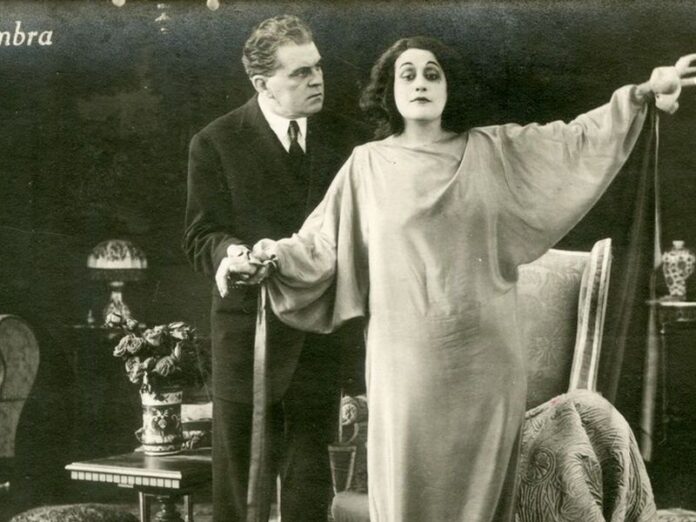I awoke with good intentions but encountered even better conversations. And thus, my film viewing on this, the final day of the 44th Giornate del Cinema Muto, began at midday, with Koko the Clown. Which is a wonderful way to begin. This cartoon, Ko-Ko at the Circus (Dave Fleischer, 1926), with our inky friend squaring off against a giant, had me in stitches – which is how I ended the day too. Apt, perhaps to start with animation when today was really all about the kiddywinks.
The first feature of the day was another Ukrainian children’s film, Congratulations on Your Promotion (Yivha Hryhorovych) from 1932 – which is where I ended the day too. This was a sweet enough story of a schoolboy inventor (very pale shades of Wings of a Serf), falling behind with his schoolwork, taunted by his classmates, but finding support in the Pioneers. These kids were endearing: dreamy Vania with his schemes and swotty Katya with her equations, but the film failed to really connect for me. Still a diverting hour or two with Günter Buchwald’s music is always a pleasure.
The day continued to meander with a programme of rediscoveries, first views of Stockholm, mostly from 1897 and then a package of exotic gems from The Guerra Zacarías Collection, in Mexico. These films, all adorned with some kind of colour treatment or other, whisked us from Niagara Falls to the Katsura river in Japan, via a tour of the Apache Trail. For this challengingly diverse material, we were lucky to have Mastarclass student Ludovico Bellucci on hand, making the journey smooth.
From this point on, things begin to get serious. We are entering the final screenings of the festival. It’s a whole year before it begins all over again. How will we cope. The Chaplin strand, and the familiar presence of David Robinson with reminiscences of Chaplin meeting up in Jackie Coogan decades and decades after The Kid. This programme was all about the Chaplin juniors, kicking off with Grief (Charles F. Reisner, 1921), a brief slapstick reel that kicks off with the kiddies and detours to follow Jimmi Adams as a man concerned about being mistaken for a wanted criminal by two jiving policemen (director Reisner and also Albert Austin, who was a comrade at Fred Karno and Mutual). Reisner had worked at Keystone and later more closely with Chaplin – in the opening scene his son Dinky Dean Riesner impersonates Coogan.
The final film of the daytime screenings was one of my favourites of the whole festival, no less. We are back in the emotionally luxurious world of the diva Italia Almirante Manzini and this, L’Ombra (Mario Almirante, 1923) was acclaimed at the time as one of her greatest films. Oh wow, she can turn what should be a thankless role into a tour de force in sharply paced melodrama of marriage, malaise, mendacity and motherhood. Manzini is Bertha, a beautiful, energetic woman married to a painter named Gerardo (Alberto Collo). When she is struck by a paralysing illness, Gerardo eventually seeks out the company of her comely young relative Elena (Liliana Ardea). This double-life continues, and Elena has a child. But one day, Bertha begins to get her strength back. Manzini is stunning and never passive, despite the dynamic here. She dominates the frame even when consciously dropping out of it, shifting all the mirrors in the house up so she cannot see herself bedridden, or just peeking into it, as when she gains a little strength back and raises one hand into the mirror’s frame. Lovely lighting and great performances all round. Just melodrama magic, especially with the restrained accompaniment of José Maria Serralde Ruiz to guide us gently through the emotional wreckage.
Just one thing for it, a final dinner in Pordenone, with some new schemes to cook up alongside the ravioli di zucca. And before you know it, the festival was nearly over, with the Verdi audience clutching their sides and dropping their jaws as Buster Keaton went through hell and back in Our Hospitality (1923). It’s not over, not really, until the final frame has been unspooled, the final key struck on the piano. So we ended, in 1932, with a divinely spirited and creative home movie from a Milanese family, Vita di Famiglia. Inverno 1932 (Edoardo Scotti), , accompanied with verve and charm by Meg Morley. This was just bursting with inspired special effects, winning slapstick and even a juvenile fashion parade. Oh yes, and some of the sweetest felines in the whole festival, lapping milk, climbing trees, owning the frame. Indeed.
And of course, this home movie’s depictions of the joys of home, hearth and family – and pets – reminded us that we all have real lives to return to. Who wouldn’t be homesick after eight days away? But I suspect many of us will soon long to return to living in the dim and distant past, but one rendered gloriously bright and vivid by the personalities on screen and off, by the talented, timeless people who make the festival happen, by the stunning musicians in the orchestra pit, and the audience to share it all with. Arrivederci, Pordenone!
Intertitle of the Day
“This book will make so much noise!” Not a silent film book surely? That’s from L’Ombra
Fancy Dress of the Day
You think you’re cute? You’ll never be cuter than a toddler wearing pince-nez. As in Vita di Famiglia. Inverno 1932.
Alternative Venue of the Day
Yeah, big fan of Cinemazero over here, but the kids in the Chaplin strand turned our heads with their backyard cinemas, washing-line screens and all. Rustic,



